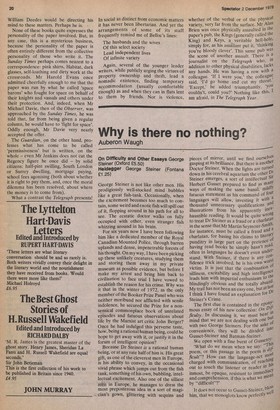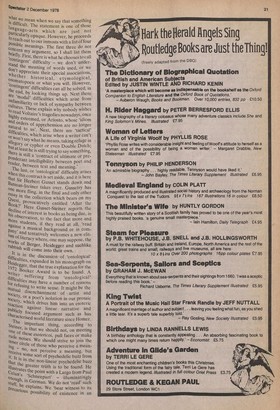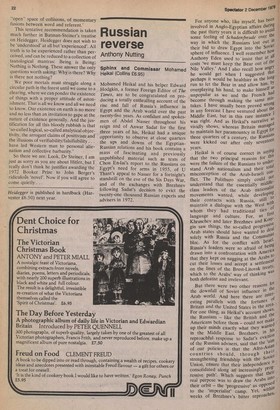Why is there no nothing .
Auberon Waugh
On Difficulty and Other Essays George Steiner (Oxford £5.50) Heldagger George Steiner (Fontana £1.25) George Steiner is not like other men. His prodigiously well-stocked mind bubbles like a great fish-tank. Occasionally, when the excitement becomes too much to contain, some weird and exotic fish will spill out of it, flopping around in his path for all to see. The ecstatic doctor walks " on fully occupied with other, even stranger fish whizzing around in his brain.
For six years now I have been following him like a dedicated member of the Royal Canadian Mounted Police, through barren uplands and dense, impenetrable forests of his thought. On my way, I have been picking up these unlikely creatures, studying them and storing them away in my private museum as possible evidence, but before I make my arrest and bring him back to civilisation to face trial I have vowed to establish the reason for his crime. Why was it that in the winter of 1972, as the only member of the Booker Prize Panel who was neither moribund nor afflicted with senile indolence, he secured the Prize for a nonsensical commonplace book of unrelated episodes and fatuous observations about life by the Marxist art critic John Berger? Once he had indulged this perverse taste, how, being a rational human being, could he hope to get away with it, or justify it in the forum of intelligent opinion?
Because Dr Steiner is a rational human being, or at any rate half of him is. His great gift, as one of the cleverest men in Europe, is his ability to convey, in the occasional vivid phrase which jumps out from the fish tank, something of his own, bubbling, intellectual excitement. Also one of the silliest mbn in Europe, he manages to dress the most preposterous idea in a sort of magician's gown, glittering with sequins and pieces of mirror, until we find ourselves gasping at its brilliance. But there is another Doctor Steiner. When the lights are turned down in his cerebral aquarium the other Dr Steiner emerges, a sort of intellectual Sir Herbert Gusset prepared to find as Man?' ways of making the same banal, mild*? fatuous statement as his command of four languages will allow, investing it with r; thousand unnecessary qualifications, anu illustrations from his apparently neghaustible reading. It would be quite wrong to treat Dr Steiner as a fraud or a charlatan in the sense that Mr Martin Seymour-Smith' for instance, must be called a fraud and a charlatan, for basing his claims to literarY, punditry in large part on the pretence !: having read books he simply hasn't reau, often in languages he doesn't even understand. With Steiner, if there is any e°a: fidence trick involved, he is his own wors: victim. It is just that the combination °' silliness, excitability and high intelligence leads him with impartial enthusiasm to the blindingly obvious and the totally ahst!td; My trail has not been an easy one, but at las` I think I have found an explanation for Dr Steiner's Crime. The first clue is contained in the eP°11,YI: mous essay of his new collectiOn: On Du fruity. In discussing it, we must bear int mind that we are not dealing with one htic with two George Steiners. For the sake °' convenience, they will be divided int° Gusset-Steiner and Batman-Steiner. We open with a fine burst of GussettY,:c 'What do we mean when we say: "Tfli' poem, or this passage in the poem is avt ficu/t"? How can the language-act ITO charged with communication, of reachill out to touch the listener or reader in hi inmost, be opaque, resistant to immedial and comprehension, if this is what we mea by "difficult"?' It does not occur to Gusset-Steiner, hiesisI him, that we monoglots know perfectly vie is What we mean when we say that something difficult. The statement is one of those language-acts which are just not Particularly opaque. However, he proceeds to reach out to our inmosts with a list of four Possible meanings. The first three do not concern my argument, so I shall list them ,briefly. First, there is what he chooses to call contingent' difficulty — we don't under stand the meaning of words used, or we don't appreciate their special associations,. Whether historical, etymological, IOnomatopoeic or what you will. However, contingent' difficulties can all be solved, in the end, by looking things up. Next there are 'modal' difficulties which arise from unfamiliarity or lack of sympathy between cultures. These explain why nobody wishes to read Voltaire's tragedies nowadays, once highly esteemed, or Ariosto, whose 'idiom and orders of apprehension are no longer natural to us'. Next, there are 'tactical' difficulties, which arise when a writer can't i or won't say what he means, taking refuge n allegory or cypher or even Double Dutch; but at least he is still trying to say something, there is still a 'contract of ultimate or prePonderant intelligibility between poet and reader, between text and meaning.' The last, or 'ontological' difficulty arises i When this contract is set aside, and it s here that Sir Herbert Gusset stands down and 8atman-Steiner takes over. Gussetry has one more fling, in the final and only other essay in the collection which bears on my Quest, provocatively entitled 'After the nook?' Here Gusset-Steiner reports the decline of interest in books as being due, in his observation, to the fact that more and more students, if they read at all, 'read against a musical background or in comPanY" and tentatively welcomes a new elitism of literacy where, one may suppose, the Works of Berger, Heidegger and suchlike rubbish will come into their own. It. is in the discussion of 'ontological' difficulties expanded in his monograph on Heide gger, that the true explanation for the 1972 Booker Award is to be found. A writer suffering from 'ontological' for may have a number of reasons tor refusing to write sense. It might be the mutual disenchantment of artist and s°cletY, or a poet's isolation in our prosaic seeiety, which drives him into an esoteric reaction against linear narrative and Publicly focused argument such as has characterised world literature since Homer The important thing, according to Steiner, is that we should not, on meeting one of these esotericoi, pull faces or make Ill. de noises. We should strive to join the inner circle of those who perceive a mean 7 no, not perceive a meaning, but receive some sort 4 psychedelic buzz from tilt. It is in the non-linear psychedelic buzz .,"at the greater truth is to be found. He cldustrates the point with a Largo from Paul elan's `Sehneepart' — illuminatingly enough, in Gerrnan. We do not 'read' such stuff, he explains. We 'bear witness to its Precarious possibility of existence in an "open" space of collisions, of momentary fusions between word and referent.'
This tentative recommendation is taken much further in Batman-Steiner's treatise on Heidegger. Heidegger does not wish to be 'understood' at all but 'experienced'. All truth is to be experienced rather than perceived, and can be reduced to a collection of tautological mantras: Being is Being; Nothing is Nothing. These answer the only questions worth asking: Why is there? Wily is there not nothing?
We poor mortals must struggle along a circular path in the forest until we come to a clearing, where we can ponder the existence of things with a proper attitude of astonishment. That is all we know and all we need to know. Our existence on earth is no more and no less than an invitation to gape at the nature of existence generally. And the justification for all this bloody rubbish is that 'so-called logical, so-called analytical objectivity, the arrogant claims of positivism and the illusions of verifiability/falsifiability. . . have led Western man to personal alienation and collective barbarity.'
So there we are. Look, Dr Steiner, I am just as sorry as you are about Hitler, but I' really don't think he justifies awarding the 1972 Booker Prize to John Berger's ridiculoUs 'novel'. Now if you will agree to come quietly . .








































 Previous page
Previous page